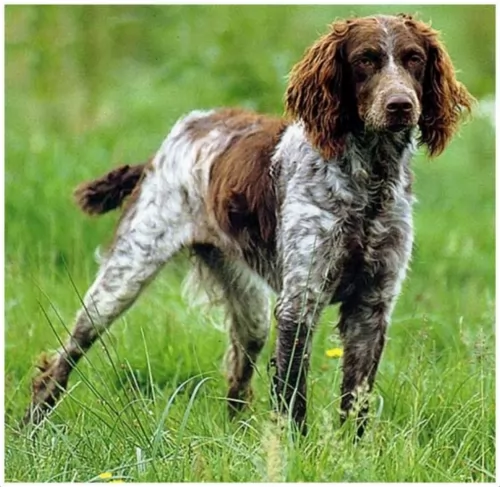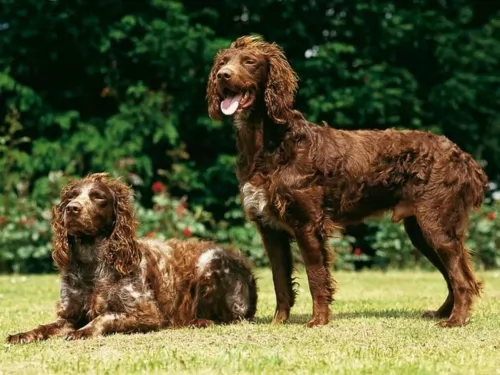 Petzlover
Petzlover Both Briard and Pont-Audemer Spaniel are originated from France. Briard may grow 11 cm / 5 inches higher than Pont-Audemer Spaniel. Briard may weigh 13 kg / 29 pounds more than Pont-Audemer Spaniel. Both Briard and Pont-Audemer Spaniel has almost same life span. Both Briard and Pont-Audemer Spaniel has almost same litter size. Briard requires High Maintenance. But Pont-Audemer Spaniel requires Moderate Maintenance
Both Briard and Pont-Audemer Spaniel are originated from France. Briard may grow 11 cm / 5 inches higher than Pont-Audemer Spaniel. Briard may weigh 13 kg / 29 pounds more than Pont-Audemer Spaniel. Both Briard and Pont-Audemer Spaniel has almost same life span. Both Briard and Pont-Audemer Spaniel has almost same litter size. Briard requires High Maintenance. But Pont-Audemer Spaniel requires Moderate Maintenance
 Through myth and legend, the Briard is thought to be a very ancient dog. A French herding breed, a Briard type of dog appears in writings as early as the end of the 14th century. According to legends the Briard was owned by Napoleon, Charlemagne, Lafayette and Thomas Jefferson. As a cross between the Barbet and the Beauceron, the Briard came into popularity following its appearance in a Paris dog show in 1863. Bred originally to guard and herd sheep, these intelligent, independent dogs were often left on their own. Because they both guarded and herded, their size and structure as well as their personalities were different from other dogs that worked sheep. Those that herded only were fast, agile and smaller. Those that only guarded were heavier, bigger and stronger. The Briard was in-between these two types of breeds. He was well suited to any kind of farm work and guarded the crops from the sheep’s desire to eat them. They moved the sheep from one grazing area to another and then to their holding area at night. No humans had to assist the Briard in this work once they were trained.
Through myth and legend, the Briard is thought to be a very ancient dog. A French herding breed, a Briard type of dog appears in writings as early as the end of the 14th century. According to legends the Briard was owned by Napoleon, Charlemagne, Lafayette and Thomas Jefferson. As a cross between the Barbet and the Beauceron, the Briard came into popularity following its appearance in a Paris dog show in 1863. Bred originally to guard and herd sheep, these intelligent, independent dogs were often left on their own. Because they both guarded and herded, their size and structure as well as their personalities were different from other dogs that worked sheep. Those that herded only were fast, agile and smaller. Those that only guarded were heavier, bigger and stronger. The Briard was in-between these two types of breeds. He was well suited to any kind of farm work and guarded the crops from the sheep’s desire to eat them. They moved the sheep from one grazing area to another and then to their holding area at night. No humans had to assist the Briard in this work once they were trained.
During World War 1, the Briards were drafted into service as messengers, sentries and search dogs for lost or injured soldiers. In that time frame the breed served almost to the point of extinction. Breeding programs following the war brought them back. Today the Briard is a home companion, a police dog, as well as both military and civilian search and rescue dogs.
 The Pont-Audemer Spaniel hails from France. The dog, known also as Epagneul Pont-Audemer is a rare breed of gun dog, and dates back to the 19th century.
The Pont-Audemer Spaniel hails from France. The dog, known also as Epagneul Pont-Audemer is a rare breed of gun dog, and dates back to the 19th century.
There aren’t clear records on the origins of the dog, but it is thought that it was developed during the 19th century. It is also thought that the dog was bred from the English Water Spaniel and the Irish Water Spaniel.
When numbers of these dogs declined, the president of the Pont-Audemer breed club permitted other breeds to be crossed with the existing gene pool. In 1980, the breed club merged with the Picardy Spaniel club and the dog is recognized by the FCI as the Pont-Audemer Spaniel.
 The Briard is a powerful, intelligent and independent working dog. They have a straight topline and their height is almost the same as their length. They have long, large, rectangular heads with wide muzzles. Their noses are also square and jet black while their side set, large eyes can be black-brown or black. Their ears have traditionally been cropped but with more countries outlawing it, they can now have natural ears set high on the head. They have a tail that is feathered and low-cut. The feet of a Briard are round, compact and large.
The Briard is a powerful, intelligent and independent working dog. They have a straight topline and their height is almost the same as their length. They have long, large, rectangular heads with wide muzzles. Their noses are also square and jet black while their side set, large eyes can be black-brown or black. Their ears have traditionally been cropped but with more countries outlawing it, they can now have natural ears set high on the head. They have a tail that is feathered and low-cut. The feet of a Briard are round, compact and large.
The Briard is a double coated breed with a long beard and mustache. Their hair completely covers the head and the eyes so that they are not seen. They have prominent eyebrows as well.
 The Pont Audemer Spaniel is a medium- to large-sized breed, standing at between 50 and 58cm in height and weighing in the region of 20 – 27kg, the Pont Audemer Spaniel has a wavy, slightly curly coat of medium length, with some long hair on the top of his head. Common coat colors include white and reddish brown although there are some solid colors too. Te Muzzle of the dog is longish and fairly pointed, the nose brown and they eyes amber or hazel. This is a deep chested dog and wile the tail is traditionally docked, these days it tends to be left long and carried with a slight curve.
The Pont Audemer Spaniel is a medium- to large-sized breed, standing at between 50 and 58cm in height and weighing in the region of 20 – 27kg, the Pont Audemer Spaniel has a wavy, slightly curly coat of medium length, with some long hair on the top of his head. Common coat colors include white and reddish brown although there are some solid colors too. Te Muzzle of the dog is longish and fairly pointed, the nose brown and they eyes amber or hazel. This is a deep chested dog and wile the tail is traditionally docked, these days it tends to be left long and carried with a slight curve.
The Pont Audemer Spaniel is an intelligent dog that will respond well to training. Training and socialization are important for making him well-rounded and obedient. This spaniel-type dog just loves having loads of fun, even to the extent of being clownish.
Because he is a working dog, and an energetic one at that, he wouldn’t do well in a tiny city property but is better suited to life in the suburbs or the countryside. He is a playful dog and will get on well with children. He can also make a great friend of other dogs, particularly if he grew up with them.
 As mentioned previously the Briard is intelligent and independent. They are also loyal, rugged, protective and bond intensely with their humans. They are often aloof when it comes to strangers or even when new furniture is introduced into the household. They have to learn that anything new into the family environment is friendly and good. They are great with children and susceptible to separation anxiety because of their deep affection for their people. Socialization for puppies is a must. This will let them know that people and children, other dogs in general are not harmful to their families. They have great memories and once they learn something – right or wrong – it is almost impossible to change it. They were bred to be independent thinkers who acted on their own conclusions. This is still true of the breed today, making them appear to be stubborn.
As mentioned previously the Briard is intelligent and independent. They are also loyal, rugged, protective and bond intensely with their humans. They are often aloof when it comes to strangers or even when new furniture is introduced into the household. They have to learn that anything new into the family environment is friendly and good. They are great with children and susceptible to separation anxiety because of their deep affection for their people. Socialization for puppies is a must. This will let them know that people and children, other dogs in general are not harmful to their families. They have great memories and once they learn something – right or wrong – it is almost impossible to change it. They were bred to be independent thinkers who acted on their own conclusions. This is still true of the breed today, making them appear to be stubborn.
They are great watchdogs, fearless and brave; willing to learn, eager to make you happy. They are basically gentle but that always runs up against their protective nature. A strong alpha leader is needed to handle this hard-working dog.
 This is truly an old breed of spaniel, loving to spend time outdoors and in marshy areas.
This is truly an old breed of spaniel, loving to spend time outdoors and in marshy areas.
He is a calm, gentle breed, and passionate breeders have worked to preserve it as the dog makes a splendid pet. With an amicable look on his face which has a kind expression, he has other good characteristics to his name such as being intelligent, courageous and energetic.
Whether you’re indoors or out, the Pont-Audemer spaniel is a great companion thanks to his loyalty. Your docile, affectionate and cheerful friend will ensure you tick him off as a pet to be recommended.
 Being a large breed, the Briard shares many of the same health concerns as other large breeds. They have a few of their own as well. Typical issues for a Briard might include:
Being a large breed, the Briard shares many of the same health concerns as other large breeds. They have a few of their own as well. Typical issues for a Briard might include:
Progressive Retinal Atrophy/Degeneration –degeneration of the photoreceptors and retina.
 There isn’t a great deal of information on this dog as it is a fairly uncommon breed, but nonetheless a robust dog breed. He can reach 14 years or more if well cared for.
There isn’t a great deal of information on this dog as it is a fairly uncommon breed, but nonetheless a robust dog breed. He can reach 14 years or more if well cared for.
Their long, floppy ears may be a problem as dogs with long ears like this, where sunlight and air don’t reach the insides of the ear, are more prone to dampness, dirt and wax. The inside of the ears becomes a breeding place for bacteria.
It is the deep chest of the Pont-Audemer Spaniel that can put him at risk for developing bloat. When a dog like this becomes bloated you can actually see the swollen, hard stomach. The dog is extremely restless, he is panting and pacing. Immediate veterinary attention is required as this is a life threatening illness.
Known also as alopecia, there are a few things that can cause your pet to lose his hair. These can be hormonal issues or parasites such as worms.
 It is best to feed the Briard smaller meals 2-3 times a day to prevent bloat. Feed 3-4 cups total for the day of a dry dog food that is high quality and made for large breeds.
It is best to feed the Briard smaller meals 2-3 times a day to prevent bloat. Feed 3-4 cups total for the day of a dry dog food that is high quality and made for large breeds.
Stationary Night Blindness – Congenital limited vision in the dark can vary from slight difficulty moving to complete inability to see in the dark.
Progressive Retinal Atrophy/Degeneration – Can lead to night blindness, limited or total blindness. Puppies with the disease can be blind before their first birthday.
Bloat (Gastric Torsion) – Stomach is distended and twists. Fatal if not treated quickly. Caused by eating a large meal quickly and either exercise immediately or drink a large amount of water right after eating.
Von Willebrand’s Disease – Blood clotting disorder leads to excessive bleeding. There is no cure, but it is manageable.
The Briard is a working dog and as such needs a job. They excel at agility, flyball, herding, obedience, confirmation and tracking. They need exercise and make excellent service dogs for people with disabilities and therapy dogs for those in emotional need.
 The Pont-Audemer Spaniel has always been a working breed so he is used to being active. They have high exercise requirements and will require having quite a large outdoor space to run. Ball and rope games are a must for him, lots of swimming and hikes as well as a daily walk.
The Pont-Audemer Spaniel has always been a working breed so he is used to being active. They have high exercise requirements and will require having quite a large outdoor space to run. Ball and rope games are a must for him, lots of swimming and hikes as well as a daily walk.
Even though the fairly long hair of the spaniel looks as though it may require quite a bit of upkeep, the Pont Audemer Spaniel is a low maintenance dog that will require a good brush twice a week.
While you’re brushing him, feel him over for any new, unusual lumps. Look into his eyes to make sure they’re bright and alert. Check around his ears for ticks and fleas and look inside his ears for dirt and wax which could lead to bacteria and an ear infection.
You don’t want your dog gaining weight and becoming obese as this opens up a whole lot of health issues. There are always dogs that can gain weight after they have been spayed or neutered. Remember if you’re using commercially manufactured dog food, to make sure it is high quality and also suited to your dog’s age, it’s season of life and its activity levels.
Give your canine friend some home-made food too, bearing in mind that dogs like simple, healthy food that won’t upset their stomachs, and which will be good for them too.
Boiled chicken, brown rice or pasta, sweet potatoes, carrots and spinach all chopped up can be so beneficial for your pet. If you cook it in bulk, it can be put into portions and some of this can be added into the dry kibble occasionally. This is a great treat for your dog.
Some raw meat added in from time to time can also be hugely benefit for your pet. Avoid all spicy, exotic foods for your pet.
Make sure he always has a bowl of fresh, cool water available to him.